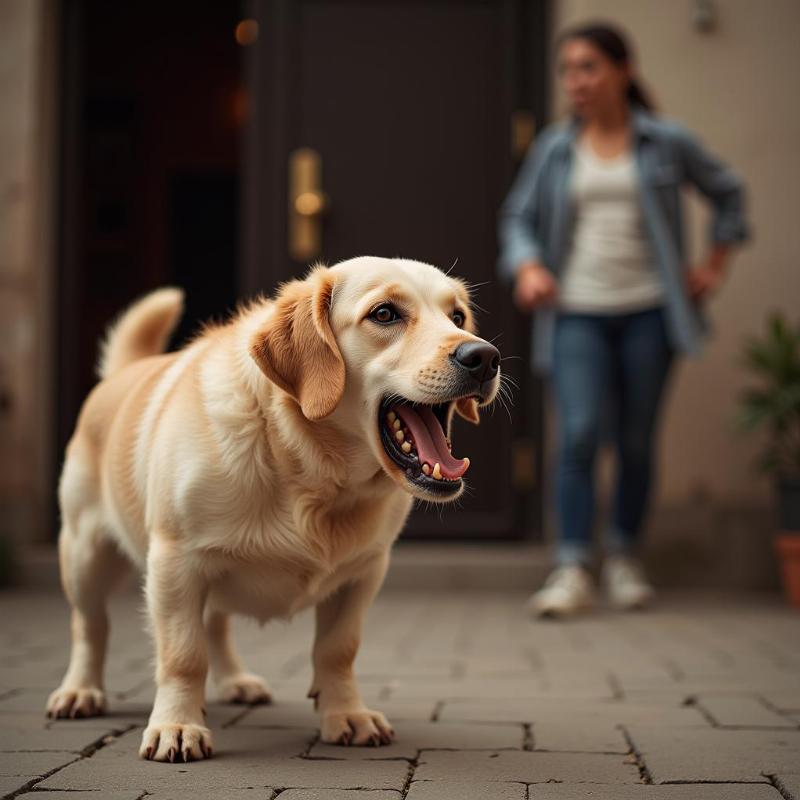Aggressive dog boarding and training requires careful consideration and a specialized approach. Finding the right facility for your dog is crucial for their safety, well-being, and successful behavioral modification. This article will guide you through the process of selecting an appropriate boarding and training program in the US, ensuring your dog receives the care and attention they need.
Understanding Aggressive Dog Behavior
 Aggressive Dog Behavior Signs
Aggressive Dog Behavior Signs
Before searching for aggressive dog boarding and training, it’s essential to understand the root cause of your dog’s aggression. Is it fear-based, territorial, possessive, or related to other triggers? A qualified veterinarian or certified professional dog trainer can assess your dog’s behavior and recommend the best course of action. This initial assessment will help you identify programs that cater to your dog’s specific needs. Many facilities specialize in certain types of aggression, so understanding the underlying issue is key.
Choosing the Right Aggressive Dog Boarding and Training Program
Selecting the right program for your aggressive dog requires thorough research. Look for facilities that prioritize safety and employ experienced trainers certified in handling aggressive dogs. Inquire about their training methods, ensuring they align with positive reinforcement techniques and avoid punishment-based approaches. Ask about staff-to-dog ratios and the level of supervision provided. A lower ratio ensures more individualized attention. Furthermore, investigate the facility’s safety protocols, including secure fencing, double-gated entry systems, and muzzle training when necessary.
Key Considerations for Aggressive Dog Boarding and Training
When evaluating potential programs, consider the following:
- Individualized Training Plans: Ensure the program develops a tailored training plan addressing your dog’s specific needs and triggers.
- Experienced and Certified Trainers: Look for trainers with a proven track record of successfully rehabilitating aggressive dogs. Certifications from reputable organizations like the Certification Council for Professional Dog Trainers (CCPDT) are a good indicator of expertise.
- Safe and Secure Environment: The facility should prioritize safety with appropriate fencing, secure kennels, and protocols for handling aggressive dogs.
- Ongoing Support and Communication: Choose a program that offers ongoing support and communication throughout the training process and after your dog returns home.
- Behavioral Modification Techniques: Inquire about the specific training methods used and ensure they emphasize positive reinforcement and avoid harsh or aversive techniques.
Questions to Ask Potential Boarding and Training Facilities
- What is your experience with aggressive dogs?
- What training methods do you employ?
- What safety measures are in place to prevent incidents?
- What is the staff-to-dog ratio?
- Do you offer individualized training plans?
- What is your policy on medication for aggressive dogs?
- Do you provide ongoing support after the training program?
Conclusion
Finding the right aggressive dog boarding and training program is crucial for your dog’s well-being and successful rehabilitation. By carefully researching facilities, asking the right questions, and prioritizing safety and positive reinforcement methods, you can ensure your dog receives the best possible care and training. Remember, this is an investment in your dog’s future and your peace of mind.
FAQ
- How much does aggressive dog boarding and training cost? The cost varies depending on the program’s length, intensity, and location. Expect to pay more for specialized programs.
- How long does aggressive dog training take? The duration of training depends on the severity of the aggression and the dog’s individual response. It can range from a few weeks to several months.
- Can all aggressive dogs be rehabilitated? While many aggressive dogs can be successfully rehabilitated, some may require lifelong management.
- What should I do if my dog bites someone? Seek immediate veterinary attention for the injured person and consult with a qualified dog trainer or behaviorist to address the dog’s aggression.
- Is it safe to board an aggressive dog? With proper safety protocols and experienced staff, aggressive dogs can be safely boarded and trained in specialized facilities.
- What are the signs of dog aggression? Signs of aggression include growling, snarling, snapping, biting, lunging, and a stiff body posture.
- How can I prevent my dog from becoming aggressive? Early socialization, consistent training, and addressing any underlying medical or behavioral issues can help prevent aggression.
places that take aggressive dogs
Beautdogs.us is your premier online resource for comprehensive dog care information, breed-specific advice, and access to a wide range of dog products and services. Whether you’re a new dog owner or a seasoned expert, Beautdogs.us provides authoritative and engaging content to help you navigate the joys and challenges of dog ownership. From finding the right aggressive dog boarding and training program to everyday care tips, we’re here to support you and your canine companion. Contact us today for personalized assistance: Email: [email protected], Phone: +1 501-555-7529. Connect with Beautdogs.us, your trusted partner in dog care.